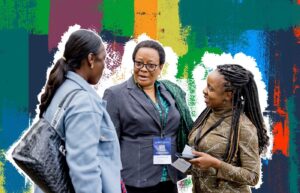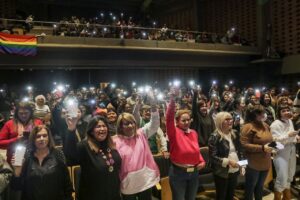Overview
Through their action plans, OGP members have made more than 20 commitments that use transparency, participation and accountability to address the needs and priorities of the LGBTQIA+ community.
These commitments range from improving policy-making by engaging with LGBTQIA+ communities, collaborating with LGBTQIA+ organizations as part of the co-creation process, or designing commitments that specifically advance LGBTQIA+ rights or reduce discrimination.
As of June 2022, 49 members have made 166 commitments that focus on gender, with a small sub-section of those commitments focused on LGBTQIA+ communities. 5 percent of OGP members are implementing LGBTQIA+ commitments. One-quarter of members in the Americas have made at least one commitment in this area.
These numbers show that open government is an underutilized resource to support the rights, civil liberties, and policy needs of the LGBTQIA+ community. Transparent and reliable data can ensure policy is driven by evidence and facts, particularly related to discrimination and the impact of policy on the LGBTQIA+ community. Participation by the LGBTQIA+ community in policy-making and service delivery can ensure that LGBTQIA+ voices are heard and changes are more likely to effectively reflect their needs. Mechanisms for members of the LGBTQIA+ community to monitor and provide oversight can ensure their unique experiences and suggestions lead to more accountable and inclusive government and public services.
OGP sees examples of these opportunities from within the Partnership, from improving policy-making by engaging with LGBTQIA+ communities in Canada and Uruguay, to raising awareness about LGBTQIA+ rights in Germany, to working to eradicate violence against people due to their gender or sexual orientation in Ecuador.

How Kenya Is Advancing Inclusive Economic Development through Public Procurement
Greater inclusion, especially in the public procurement process, offers a critical opportunity for governments to deliver on large-scale investments for a more resilient, equitable economy while reinforcing anti-corruption reforms. Learn how Kenya aims to increase the proportion of contracts awarded to marginalized groups while improving the interoperability of its procurement system in its current open contracting commitment.

Faces of Open Government: Agila Barzdienė and Rugilė Trumpytė
To mark the International Day for People with Disabilities, Agila Barzdienė and Rugilė Trumpytė discuss how socially responsible procurement is advancing inclusion and accessibility in Lithuania.

Open Gov Challenge Tracker
Discover initiatives submitted to the Open Gov Challenge by OGP members and beyond, through OGP action plans or as standalone commitments.

Rethinking Public Policies from a Gender Perspective
Replanteando las políticas públicas desde una perspectiva de género
Learn about Argentina's efforts to integrate gender and diversity perspectives into Argentina’s fourth open government national action plan as a tool for mainstreaming into future open government commitments.
Esta publicación de blog explora los aspectos más destacados del informe de Argentina, Incorporación de la Perspectiva de géneros y diversidad en el Cuarto Plan de Acción Nacional de Gobierno Abierto. Encuentre el resumen ejecutivo disponible en inglés y español…
